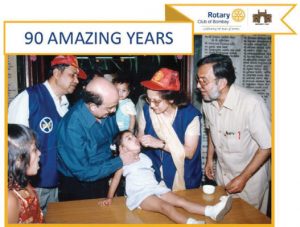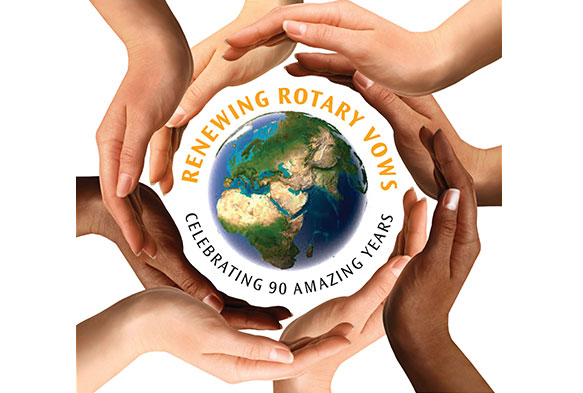
Celebrating 90 Amazing Years
BACK TO THE FUTURE
A DECADE FROM NOW, WHEN THE ROTARY CLUB OF BOMBAY TURNS HUNDRED, WE WILL LOOK BACK AND SEE HOW WE HAVE SERVED THOSE IN NEED. This will not be to rest on our laurels but to gauge the work done and to evaluate what remains to be done.
These are uncertain times. Political ambiguities, changing social and cultural orders, an ever-accelerating pace of life, and the widening gap between the haves and the have-nots: all of these in the context of a burgeoning, capitalistic mindset – towards which star will the average Rotarian point his moral compass?
This special issue of The Gateway celebrates RCB’s 90th year by drawing inspiration from the greats. Few exemplify the spirit of ‘Service Above Self’, the Rotary motto, better than Mahatma Gandhi. Since its publication, many have disagreed with his ‘Seven Points for a New World Order’, printed in The Rotarian in February 1942, which we extract here, but few can argue that there are strong parallels between his principles and those that guide the Rotarian way of life.
As for what one should inspire to, what those of us who have, should do for those who don’t have – it is worth elucidating the rights of man. The Gateway extracts an essay from The Rotarian dated September 1941 written by historian and novelist H.G. Wells, whose wealth of imagination gave us the dystopian alien novel The War of the Worlds. And whose immense well of empathy and deep compassion for human kind gave us a Declaration of Basic Rights.
ON THIS, OUR 90TH ANNIVERSARY, WE RENEW OUR VOWS, OUR PROMISE TO ROTARY’S SUPREME PRINCIPLE: SERVICE ABOVE SELF.
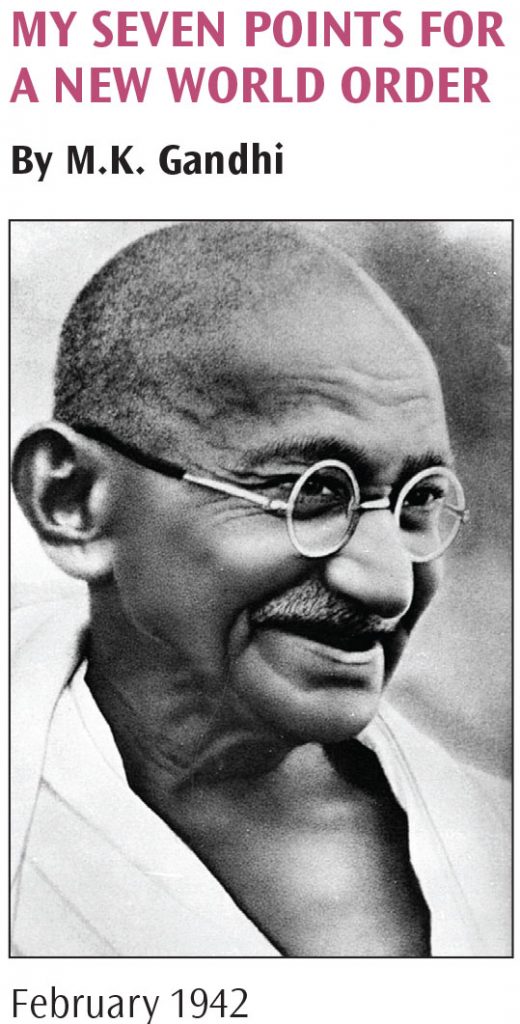 1. Equal Distribution
1. Equal Distribution
The real implication of equal distribution is that each man shall have the wherewithal to supply all his natural needs and no more. For example, if one man has a weak digestion and requires only a quarter of a pound of flour for his bread and another needs a pound, both should be in a position to satisfy their wants.
We may not, perhaps, be able to realise this goal, but we must bear it in mind and work unceasingly to come close to it.
2. Individual Action
It is perfectly possible for an individual to adopt this way of life without having to wait for others to do so. And if an individual can observe a certain rule of conduct, it follows that a group of individuals can do likewise. No one need wait for anyone else in order to adopt a right course. MEN GENERALLY HESITATE TO MAKE A BEGINNING IF THEY FEEL THAT THE OBJECTIVE CANNOT BE HAD IN ITS ENTIRETY. SUCH AN ATTITUDE IS A BAR TO PROGRESS.
3. The Role of the Wealthy
At the root of this doctrine of equal distribution must lie that of the trusteeship of the wealthy for the superfluous wealth possessed by them. For according to the doctrine they may not possess a rupee more than their neighbours. How is this to be brought about? Non-violently? Or should the wealthy be dispossessed of their
possessions? To do his we naturally have to resort to violence. Violent action cannot benefit society. Society will be poorer, for it will lose gifts of men who know how to accumulate wealth. Therefore, the non-violent way is evidently superior. The rich man will be left in possession of his wealth, of which he will use what he reasonably requires for his personal needs and will act as a trustee for the remainder to be used for society. In this argument honesty on the part of the trustee is assumed.
4. Servant of Society
As soon as man looks upon himself as a servant of society, earns for its sake, spends for its benefit, then purity enters into his earnings and there is ahimsa in his venture. Moreover, if men’s minds turn toward this way of life, there will come about a peaceful revolution in society – without bitterness.
5. Ahimsa
Somehow or other the wrong belief has taken possession of us that ahimsa is pre-eminently a weapon for individuals and its use should therefore be limited to that sphere. In fact, this is not the case. AHIMSA IS DEFINITELY AN ATTRIBUTE OF SOCIETY. TO CONVINCE PEOPLE OF THIS TRUTH IS AT ONCE MY EFFORT AND MY EXPERIMENT.
6. The Law of God
To try to root out religion itself from society is a wildgoose chase. And were such an attempt to succeed, it would mean the destruction of society. The ultimate definition of religion may be said to be obedience to the law of God. God and His law are synonymous terms. Therefore God signifies an unchanging and living law. No one has really found Him. But avatars and prophets have, by their “tapasya,” given to mankind a faint glimpse of eternal law.
7. Non-violent Cooperation
The rich cannot accumulate wealth without the cooperation of the poor in society. Man has been conversant with violence from the beginning, for he has inherited this strength from the animal in his nature. It was only when he rose to the state of a man that the knowledge of the strength of ahimsa entered into his soul. This knowledge has
grown within him slowly but surely. If this knowledge were to penetrate to and spread amongst the poor, they would become strong and would learn how to free themselves by means of non-violence from the crushing inequalities which have brought them to the verge of starvation.
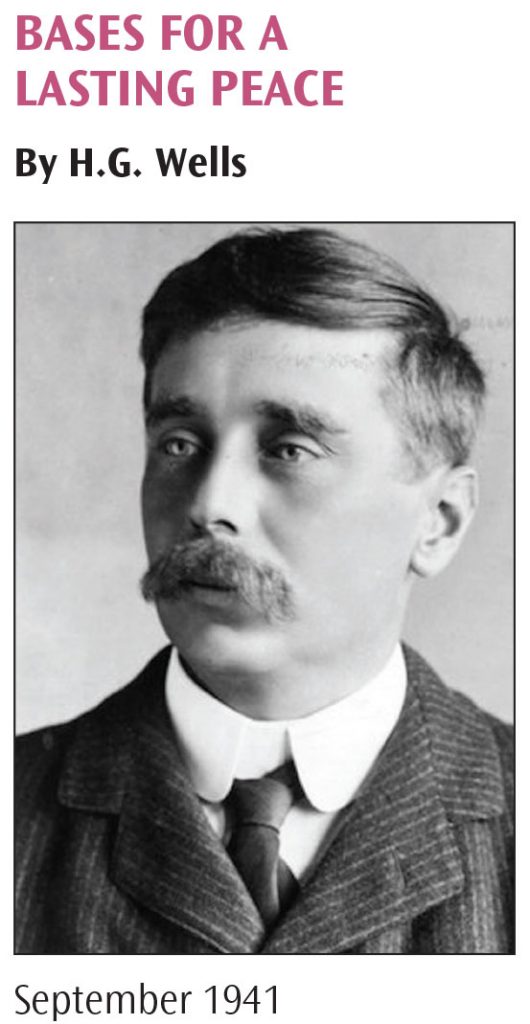
1. Right to Live
Every man is a joint inheritor of all the natural resources and of the powers, inventions, and possibilities accumulated by our forerunners. He is entitled, within the measure of these resources and without distinction of race, colour or professed beliefs or opinions, to the nourishments, covering, and the medical care needed to realise his full possibilities of physical and mental development from birth to death. All men are to be deemed absolutely equal in the law and equally entitled to the respect of their fellow-men.
(BASES FOR A LASTING PEACE BY H.G. WELLS)
2. Protection of Minors
The natural and rightful guardians of those who are not of an age to protect themselves are their parents. In default of such parental protection in whole or in part, the community, having due regard to the family traditions of the child, shall accept or provide alternative guardians.
3. Duty to the Community
It is the duty of every man not only to respect but to uphold and to advance the rights of all other men throughout
the world. Furthermore, it is his duty to contribute such service to the community as will insure the performance of those necessary tasks for which the incentives which will operate in a free society do not provide.
4. Right to Knowledge
It is the duty of the community to equip every man with sufficient education to enable him to be as useful and interested a citizen as his capacity allows. Furthermore, it is the duty of the community to render all knowledge available to him and such special education as will give him equality of opportunity for the development of his distinctive gifts in the service of mankind.
5. Freedom of Thought and Worship
Every man has a right to the utmost freedom of expression, discussion, association and worship.
6. Right to Work
Subject to the needs of the community, a man may engage in any lawful occupation, earning such pay as the contribution that his work makes to the welfare of the community may justify. He is entitled to paid employment and to make suggestions as to the kind of employment which he considers himself able to perform. Work for the sole object of profit-making shall not be a lawful occupation.
7. Right in Personal Property
In the enjoyment of his personal property, lawfully possessed, a man is entitled to protection from public or private violence, deprivation, compulsion, intimidation.
8. Freedom of Movement
A man may move freely about the world at his own expense. His private dwelling, however, and any reasonably limited
enclosure of which he is the occupant, may be entered only with his consent or by a legally qualified person
empowered with a warrant as the law may direct, so long as by his movement he does not intrude upon the private domain of any other citizen, harm, or disfigure or encumber what is not his, interfere with or endanger its proper use, or seriously impair the happiness of others, he shall have the right to come and go wherever he chooses, by land, air, or water over any kind of country, mountain, moorland, river, lake, sea, or ocean, and all the ample spaces of this, his world.
9. Personal Liberty
Unless a man is declared by a competent authority to be a danger to himself or to others through mental abnormality, a declaration which must be confirmed within seven days and thereafter reviewed at least annually, he shall not be
restrained for more than 24 hours without being charged with a definite offense, nor imprisoned for more than three months without a trial. At a reasonable time before his trial, he shall be furnished with a copy of the evidence which it is proposed to use against him. At the end of the three-month period, if he has not been tried and sentenced by due process of law, he shall be acquitted and released. No man shall be charged more than once with the same offense.
10. Freedom from Violence
No man shall be subjected to any sort of mutilation except with his own deliberate consent, freely given, nor to
forcible handling, except in restraint of his own violence, not to torture, beating, or any other physical ill reatment. He shall not be subjected to mental distress, or to imprisonment in infected, verminous, or otherwise unsanitary quarters, or to be put into the company of verminous or infected people.
11. Right of Lawmaking
Rights embodied in this Declaration are fundamental and inalienable. In conventional and in administrative matters,
but in no others, it is an obvious practical necessity for men to relinquish the free play of certain of these fundamental rights (in, for example, such conventional matters as the rule of the road or the protection of money from forgery, and in such administrative matters as town and country planning or public hygiene). But no law, conventional or administrative, shall be binding on any man or on any section of the community, unless it has been made openly with the active or tacit acquiescence of every adult citizen concerned, given either by direct majority vote of the community affected or by majority vote of its representatives publicly elected. These representatives shall be ultimately responsible for all by-laws and for detailed interpretations made in the executions of the law. In matters of cooperative and collective action, man must abide by the majority decisions ascertained by electoral methods which give effective expression to individual choice. All legislation must be subject to repeal. No treaties or contracts shall be made secretly in the name of the community. The fount of legislation in a free world is the whole people, and since life flows on constantly to new citizens, no generation can, in whole or in part, surrender or delegate this legislative power which is inalienably inherent in mankind.
Bombay’s first essay in the intricate matter of “classification” adds up to a comprehensive picture of the
dynamics of the flourishing, port city at that time.
Nearly every form of activity characteristic of an Anglo-Indian settlement was represented in the list of Charter members: Shipping, wine merchants, the press, architects, railways, oil, photography, travel, big business, news agency, telephone, bus service, Bombay port, educations, music, a Christian youth association, insurance, cars, police and hospital.
Although Rotary in Bombay in 1929 was European in inspiration and in the initiative that created it, a
need was felt, within a few weeks of its creation, to include prominent Indian Bombayites.
On April 10, the following names were deemed worth of consideration: Sir Cowasjee Jehangir, J.A.D.
Naoroji, H.P. Mody, Mirza Ali Mahomed Khan, Rahimtulla Chinoy, Santidas Askaran, Mandlik and
Ishwardas Laxmidas.
In April 1932, scientists John Cockcroft and Ernest Walton split the atom for the first time, at the
Cavendish Laboratory in Cambridge in the UK. The Rotary Club of Bombay meeting of June 1932 had an
address on “splitting the atom” showing the newsiness of subjects chosen.
A few examples of the variety of topics in those early years: J.R.D. Tata spoke about Air Mail Services in
India. There were others who gave gripping talks on The Bombay Mint, Gold and India, Across America
by Road, Advantages of Illiteracy and Squeezing One Rupee out of 12 Annas.
Early on, finding speakers was always difficult and Rotarians had to be exhorted to commit to a talk at
least once in four years. In times of war, the times were addressed without encroaching upon the sphere
of “politics”.
Some of the subjects became valuable additions to the fund of material publicly available on them. For
example: The Crisis of Democracy by Sir Jehangir Cowasjee, the Aboriginals in the Central Provinces by
Dr. Verrier Elwin and What Central Asia Means to me by Mlle. Ella Maillart.
The first motto of Rotary International, approved in 1911, was from a speech by a Chicago Rotarian, Art
Sheldon: ‘He Profits Most Who Serves Best’. At about the same time, Rtn. Ben Collins from the Rotary
Club of Minneapolis, Minnesota, proposed: ‘Service, Not Self’.
Variations of these were approved as official Rotary mottoes in 1950. In 1989, ‘Service Above Self’ was
adopted as Rotary’s primary motto as it best exemplified the philosophy of unselfish volunteer service.
Rotary’s original Constitution in 1906 had three Objects: promotion of business interests, promotion of
good fellowship and the advancement of the best interests of the community.
By 1910, Rotary had five Objects and by 1915, there were six. In 1918, the Objects were reduced to four. Four years later they had grown to six and were revised again in 1927. Finally, at the 1935 Mexico City Convention, the six were restated and reduced to four. The last major change came in 1951 when a single Object came into being with “ideal of service” being the key phrase.
The first Rotary Club banner (from Houston Space Center) to orbit the moon was carried by astronaut
Frank Borman, a member of that Club, in 1968. Other interesting sightings of the Rotary flag:
- Over the South Pole in 1929 and the North Pole four years later, hoisted by Admiral Richard Byrd.
- On a record-setting balloon ascent to 55,577 feet in 1932 by Professor Auguste Picard.
- Carried 6,254 feet beneath earth’s surface a year later, for a meeting held by the Rotary Club of
Houghton, Michigan, at the bottom of the Quincy Copper Mine.
Throughout the wide world of Rotary, many members share similar hobbies, recreational activities and avocations. Rotarians with common interests are encouraged to establish groups called World Fellowship Activities.
Some popular World Fellowship Activities are flying, amateur radio, stamp collecting, yachting, skiing, tennis and travel. The more unusual ones are genealogy, recreational vehicles, tree planting, home exchange and roaming.
An Honorary membership is the highest distinction a Rotary Club can confer and is exercised to recognise an individual’s unusual service and contribution to Rotary and society.
Some of Rotary’s distinguished Honorary members include: King Gustaf of Sweden, King George VI of England, King Badouin of Belgium, King Hassan III of Morocco, Sir Winston Churchill, humanitarian Albert Schweitzer, Charles Lindberg, composer Jean Sibelius, explorer Sir Edmund Hillary, Thor Heyerdahl, Thomas Edison, Walt Disney, Bob Hope and Margaret Thatcher.
DID YOU KNOW?
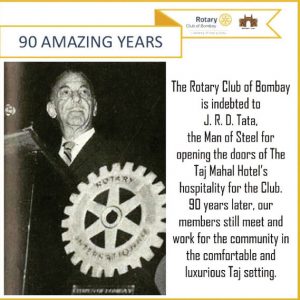 J.R.D. TATA WAS AN ACTIVE MEMBER OF THE ROTARY CLUB OF BOMBAY BETWEEN 1934 TO 1961 AND ALSO SERVED AS A DIRECTOR IN 1946-48. HE BECAME AN HONORARY MEMBER OF THE CLUB IN 1961.
J.R.D. TATA WAS AN ACTIVE MEMBER OF THE ROTARY CLUB OF BOMBAY BETWEEN 1934 TO 1961 AND ALSO SERVED AS A DIRECTOR IN 1946-48. HE BECAME AN HONORARY MEMBER OF THE CLUB IN 1961.
IT IS THANKS TO THE MAGNANIMOUS GESTURE OF J.R.D. TATA THAT OVER THE LAST SEVERAL DECADES, THE ROTARY CLUB OF BOMBAY HAS HELD ITS WEEKLY LUNCH MEETINGS AND EVENTS AT THE TAJ MAHAL HOTEL AT CONCESSIONAL RATES.
DID YOU KNOW…
PAUL P. HARRIS, A YOUNG ATTORNEY, CAME TO CHICAGO, ILLINOIS IN 1896 TO ESTABLISH HIS CAREER AND FORTUNE. HE REALISED THERE WERE OTHERS LIKE HIMSELF, SEEKING CAMARADERIE AND A SENSE OF COMMUNITY. ON FEBRUARY 23, 1905, HE AND THREE BUSINESS ACQUAINTANCES AGREED TO ORGANISE A MEN’S CLUB BASED ON AN IDEA THAT PAUL HAD BEEN CONTEMPLATING: THAT MEN
IN BUSINESS COULD BE AND SHOULD BE PERSONAL FRIENDS. THE NAME ‘ROTARY’ WAS SUGGESTED BY HARRIS BECAUSE THEY PLANNED TO MEET AT EACH MEMBER’S PLACE OF BUSINESS IN ROTATION.

DID YOU KNOW…
ERADICATING POLIO HAS BEEN A MISSION AND A LABOUR OF LOVE. THE ROTARY CLUB OF BOMBAY HAS WORKED TIRELESSLY AND UNCEASINGLY TO ERADICATE POLIO IN INDIA. RCB REACHED OUT TO OTHER CLUBS AND TOGETHER SPREAD OUT ACROSS THE NATION TO IMMUNISE EVERY CHILD.
